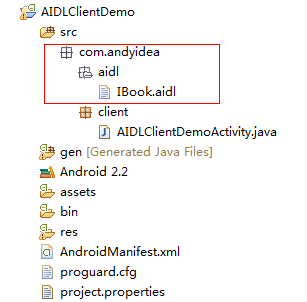AIDL机制实现进程间的通讯实例
转载自:http://blog.csdn.net/cjjky/article/details/7562652
=======================================
在Android中,每个应用程序都有自己的进程,当需要在不同的进程之间传递对象时,该如何实现呢?显然,Java中是不支持跨进程内存共享的,因此要传递对象,需要把对象解析成操作系统能够理解的数据格式,以达到跨界对象访问的目的。在Android中,则采用AIDL(Android Interface Definition Language :接口定义语言)方式实现。
AIDL (Android Interface Definition Language)是一种IDL 语言,用于生成可以在Android设备上两个进程之间进行进程间通信(IPC)的代码。如果在一个进程中(例如Activity)要调用另一个进程中(例如Service)对象的操作,就可以使用AIDL生成可序列化的参数。
AIDL IPC机制是面向接口的,它是使用代理类在客户端和实现端传递数据。
使用AIDL实现IPC
使用AIDL实现IPC服务的步骤是:
1. 创建.aidl文件-该文件(YourInterface.aidl)定义了客户端可用的方法和数据的接口。
2. 在makefile文件中加入.aidl文件-(Eclipse中的ADT插件提供管理功能)Android包括名为AIDL的编译器,位于tools/文件夹。
3. 实现接口-AIDL编译器从AIDL接口文件中利用Java语言创建接口,该接口有一个继承的命名为Stub的内部抽象类(并且实现了一些IPC调用的附加方法),要做的就是创建一个继承于YourInterface.Stub的类并且实现在.aidl文件中声明的方法。
4. 向客户端公开接口-如果是编写服务,应该继承Service并且重载Service.onBind(Intent) 以返回实现了接口的对象实例
创建.aidl文件
AIDL使用简单的语法来声明接口,描述其方法以及方法的参数和返回值。这些参数和返回值可以是任何类型,甚至是其他AIDL生成的接口。重要的是必须导入所有非内置类型,哪怕是这些类型是在与接口相同的包中。下面是AIDL能支持的数据类型:
1.Java编程语言的主要类型 (int, boolean等) — 不需要 import 语句。
2.以下的类 (不需要import 语句):
String
List -列表中的所有元素必须是在此列出的类型,包括其他AIDL生成的接口和可打包类型。List可以像一般的类(例如List<String>)那样使用,另一边接收的具体类一般是一个ArrayList,这些方法会使用List接口。
Map - Map中的所有元素必须是在此列出的类型,包括其他AIDL生成的接口和可打包类型。一般的maps(例如Map<String,Integer>)不被支持,另一边接收的具体类一般是一个HashMap,这些方法会使用Map接口。
CharSequence -该类是被TextView和其他控件对象使用的字符序列。
3.通常引引用方式传递的其他AIDL生成的接口,必须要import 语句声明
4.实现了Parcelable protocol 以及按值传递的自定义类,必须要import 语句声明。
通过对上面的基本了解,下面我就以一个具体的实例来说明Android中如何通过AIDL机制来实现两个进程中实现通讯:(情景假设:例如A应用通过服务Service方式向B应用提供通过书籍编号来查询书籍名称的服务)
A应用程序结构图如下:

通过上面的结构图可以看到,在A应用程序中创建一个 aidl 的接口,然后系统在 gen 目录下自动生成相应的 java 文件。
其中 IBook.aidl 文件的源码:
- package com.andyidea.aidl;
- interface IBook {
- String queryBook(int bookNo);
- }
其中 BookService.java 类中的源码如下:
- package com.andyidea.service;
- import com.andyidea.aidl.IBook;
- import android.app.Service;
- import android.content.Intent;
- import android.os.IBinder;
- import android.os.RemoteException;
- /**
- * 查询书籍的服务
- * @author Andy
- *
- */
- public class BookService extends Service {
- private String[] bookNames = {"Java编程思想","设计模式","Android开发设计"};
- private IBinder mIBinder = new BookBinder();
- @Override
- public IBinder onBind(Intent intent) {
- // TODO Auto-generated method stub
- return mIBinder;
- }
- /**
- * 服务中交互的方法
- * @param bookNo
- * @return
- */
- public String queryBookName(int bookNo){
- if(bookNo > 0 && bookNo <= bookNames.length){
- return bookNames[bookNo-1];
- }
- return null;
- }
- private class BookBinder extends IBook.Stub{
- @Override
- public String queryBook(int bookNo) throws RemoteException {
- return queryBookName(bookNo);
- }
- }
- }
同时别忘了在 Manifest.xml中配置该服务对象(标红色的部分),建议采用隐式方式激活该服务,适合不同的进程的意图。
- <?xml version="1.0" encoding="utf-8"?>
- <manifest xmlns:android="http://schemas.android.com/apk/res/android"
- package="com.andyidea.service"
- android:versionCode="1"
- android:versionName="1.0" >
- <uses-sdk android:minSdkVersion="8" />
- <application
- android:icon="@drawable/ic_launcher"
- android:label="@string/app_name" >
- <span style="color:#ff0000;"> <service android:name=".BookService">
- <intent-filter>
- <action android:name="com.andyidea.aidl.bookservice"/>
- </intent-filter>
- </service></span>
- </application>
- </manifest>
以上我们已经实现了A应用程序提供服务的功能,下面我们来实现B应用(或者其它需要用到A应用提供服务的应用程序)
B应用程序结构图如下:

我们看到B应用程序也要和服务端同样的 .aidl 文件,我们可以从A应用程序中把该 aidl 文件中拷贝过来就是了,呵。由于B应用中 .aidl 文件和 A应用中的 .aidl 文件源码一样,我在这里就不列出来了。
其中AIDLClientDemoActivity.java源码如下:【注:其中该客户端类要通过 bindService 方式来启动另外一个进程的服务,这样才能实现和服务进行交互。如果通过startService方式来启动服务,则不能与服务进行交互】
- package com.andyidea.client;
- import android.app.Activity;
- import android.content.ComponentName;
- import android.content.Intent;
- import android.content.ServiceConnection;
- import android.os.Bundle;
- import android.os.IBinder;
- import android.os.RemoteException;
- import android.view.View;
- import android.widget.Button;
- import android.widget.EditText;
- import android.widget.TextView;
- import com.andyidea.aidl.IBook;
- public class AIDLClientDemoActivity extends Activity {
- private EditText numberText;
- private TextView resultView;
- private Button query;
- private IBook bookQuery;
- private BookConnection bookConn = new BookConnection();
- /** Called when the activity is first created. */
- @Override
- public void onCreate(Bundle savedInstanceState) {
- super.onCreate(savedInstanceState);
- setContentView(R.layout.main);
- numberText = (EditText) this.findViewById(R.id.number);
- resultView = (TextView) this.findViewById(R.id.resultView);
- query = (Button)findViewById(R.id.query);
- Intent service = new Intent("com.andyidea.aidl.bookservice");
- bindService(service, bookConn, BIND_AUTO_CREATE);
- query.setOnClickListener(new View.OnClickListener() {
- @Override
- public void onClick(View v) {
- String number = numberText.getText().toString();
- int num = Integer.valueOf(number);
- try {
- resultView.setText(bookQuery.queryBook(num));
- } catch (RemoteException e) {
- e.printStackTrace();
- }
- }
- });
- }
- @Override
- protected void onDestroy() {
- unbindService(bookConn);
- super.onDestroy();
- }
- private final class BookConnection implements ServiceConnection{
- @Override
- public void onServiceConnected(ComponentName name, IBinder service) {
- // TODO Auto-generated method stub
- bookQuery = IBook.Stub.asInterface(service);
- }
- @Override
- public void onServiceDisconnected(ComponentName name) {
- // TODO Auto-generated method stub
- bookQuery = null;
- }
- }
- }
其中界面布局文件 main.xml 源码:
- <?xml version="1.0" encoding="utf-8"?>
- <LinearLayout xmlns:android="http://schemas.android.com/apk/res/android"
- android:layout_width="fill_parent"
- android:layout_height="fill_parent"
- android:orientation="vertical" >
- <TextView
- android:layout_width="fill_parent"
- android:layout_height="wrap_content"
- android:text="书籍编号" />
- <EditText
- android:id="@+id/number"
- android:layout_width="fill_parent"
- android:layout_height="wrap_content"/>
- <Button
- android:id="@+id/query"
- android:layout_width="wrap_content"
- android:layout_height="wrap_content"
- android:text="查询"/>
- <TextView
- android:id="@+id/resultView"
- android:layout_width="fill_parent"
- android:layout_height="wrap_content"/>
- </LinearLayout>
至此,我们已经完成了B应用程序的代码实现部分,我们要先把A应用程序部署到机器上,然后我们再运行B应用程序。下面我们通过截图来看下程序运行的结果:
通过上面的截图,我们输入书籍编号 1,就可以查询出相应的书籍名称,到此,我们就可以了解了 Android应用中如何通过AIDL机制实现两个进程的通讯。
注:本文为 Andy.Chen 原创,欢迎大家转载,转载请大家注明出处,谢谢。



